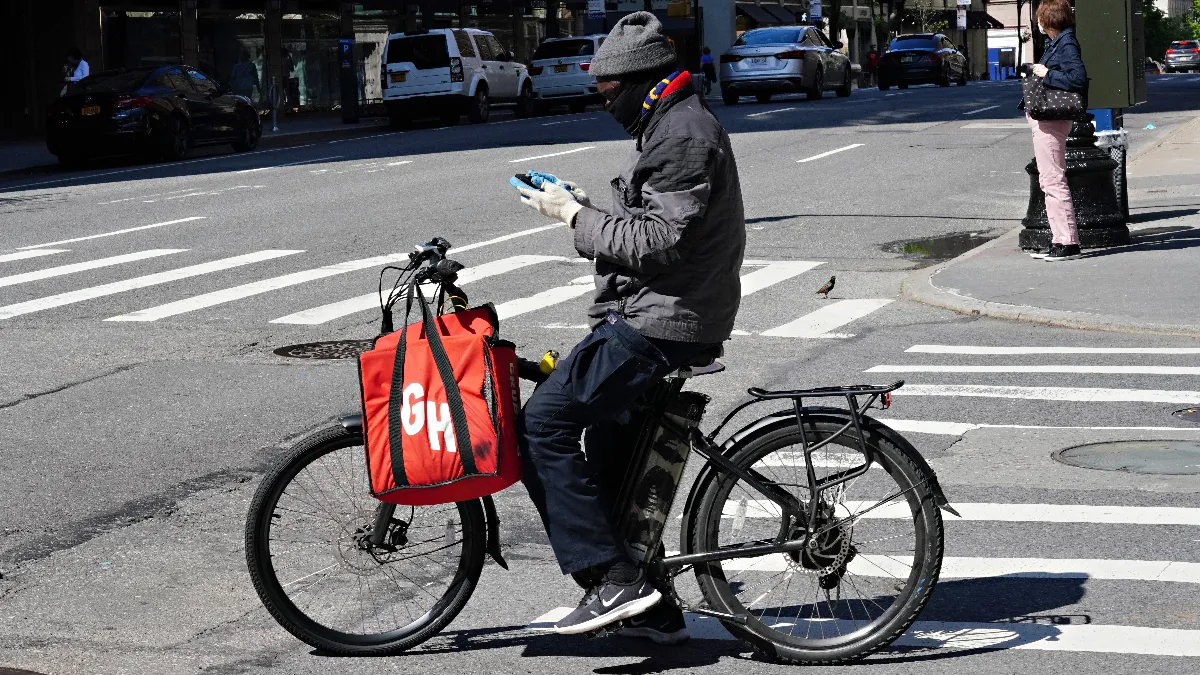Dive Brief:
- Delivery platforms DoorDash, GrubHub, Caviar, Seamless, Postmates and Uber Eats sued New York City on Thursday over the Big Apple's permanent 15% delivery fee cap, which the city passed in August
- "New York City Council passed harmful, unnecessary, and unconstitutional price controls which leave us no choice but to resolve this matter in court, as we did in San Francisco," a DoorDash spokesperson said in an email.
- The lawsuit comes just a month and a half after DoorDash and Grubhub filed a lawsuit against the city and county of San Francisco over its permanent delivery fee cap of 15%. Much like the San Francisco lawsuit, the plaintiffs claim that New York City's permanent fee cap is detrimental to restaurants, couriers and customers and should be struck down.
Dive Insight:
The New York City lawsuit claims the ordinance is unconstitutional because it interferes with freely negotiated contracts between delivery companies and restaurants since it changes the economics in which the industry operates. The suit, filed in the U.S. District Court for the Southern District of New York, also argues the city's fee cap can ultimately harm all parties involved.
"Price controls increase delivery fees for consumers, and therefore lead to a reduction of orders for both restaurants and couriers," a Grubhub spokesperson said in an email. "While Grubhub remains willing to engage with the City Council, we unfortunately are left with no choice but to take legal action."
In the lawsuit, the delivery aggregators argue the city council didn't solicit or review data to understand the impact of extended price-fixing, and accuse the council of ignoring concerns raised by various advocacy organizations and trade associations during committee hearings. Instead, the city council postponed analyzing the impact of these price controls until 2023, the lawsuit states.
"Imposing permanent price controls is an unprecedented and dangerous overreach by the government and will limit the options small businesses rely on to compete in an increasingly competitive market," the DoorDash spokesperson said.
Cities across the country put temporary delivery fee caps in place during the pandemic to lower the cost of delivery for struggling restaurants, but the plaintiffs claim permanent caps don't relate to a public health emergency and that the city has other means of helping restaurant financing, including tax breaks or grants.
"Now that restaurants are open in New York City, we will vigorously fight any attempts to curtail a free market there. Once these fee caps have fallen away, we will continue to reinvest that amount back into the business and drive further growth for local restaurants," Matthew Maloney, former Grubhub CEO and current Just Eat Takeaway board member, told investors during parent company Just Eat Takeaway's Q2 2021 earnings call.
The lawsuit claims council members have made statements that show the delivery fee cap is more about redirecting tax revenue and harming third-party platforms. It cited Council Member Francisco Moya, one of the sponsors of the ordinance, who previously introduced a 10% commission cap bill and then later tweeted, "NYC local restaurants needed a 10% cap on delivery fees from third party services like Grubhub long before #COVID19 hit us. They damn sure need it now."
The companies also argue the text of the ordinance suggests the cap targets large out-of-state third-party platforms since it doesn't impact any other business that restaurants contract with, such as wholesale food and supply companies and point-of-sales venders. The ordinance also doesn't provide justification for the 15% cap that it has "randomly selected," nor is there any justification for why the city has selected a restrictive cap on marketing services, the lawsuit claims.
"Plaintiffs spend hundreds of millions of dollars annually in marketing their platforms, which enables restaurants on their platforms to reach new and existing consumers for incremental orders, because when restaurants survive and succeed, so do Plaintiffs," the lawsuit said. "As a result, restaurants have had meaningful choice in whether and how they use delivery, order facilitation, and marketing services from Plaintiffs to grow their businesses."
During the pandemic, the top three delivery platforms also offered restaurants various relief efforts, including cutting commissions for independent restaurants and offering grants. The aggregators also expanded their products to provide additional assets for restaurants, such as turnkey websites and management tools to better understand customer order behavior.
Uber Eats declined to comment beyond the lawsuit.













